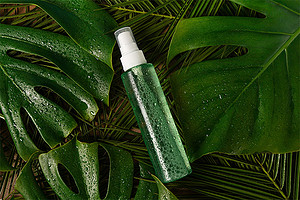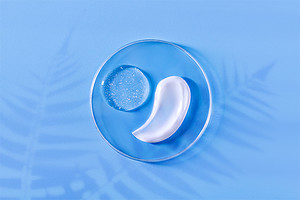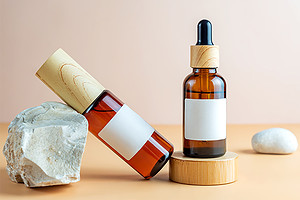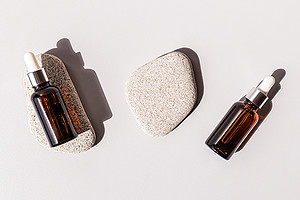Summer is a great season to run outdoors, hit the beach, sunbathe, and more. But if you have dry skin, this season can bring about a lot of challenges for your skin.

Dry skin is also called xeroderma. The dryness can make your skin feel tight, irritated, and flaky in the summer heat, leading to premature aging, vulnerability to sun damage, and infections. (1)
For this reason, a good summer skin care routine is crucial for nourishing, protecting, and hydrating your dry skin.
Read further to learn about the summer skin care routine that suits your skin type and budget and the dos and don’ts for dry skin.
Article Contents
Summer Skin Care Routine for Dry Skin
Follow this morning and night-time routine for dry skin.
Morning Routine
Here are some skin care guidelines you can follow during the morning to alleviate dry skin discomfort.
1. Cleanse gently
If you have dry skin, cleansing your face is the first step in your skin care routine, but be careful about the products you apply to your face.
Researchers say using soaps with an alkaline pH damages the lipid bilayer of the stratum corneum (skin’s outer layer) and leads to skin dryness.
If you have xerosis (dry skin), avoid using cleansing agents that may cause further dryness. Go for products containing emollient or/and humectant ingredients. (2)
A 2022 research reported the preference for synthetic detergent (syndet) cleansers as their acidic pH is similar to the skin. Some examples of synthetic detergents are sodium dodecylbenzenesulfonate and sodium lauryl sulfate.
Syndet cleansers are less irritating compared to traditional soaps. Their pH is low, and they downregulate pruritus. Therefore, to avoid skin dryness and itching, dodge traditional soaps as they alkalinize the skin. (1)
Note: Syndet is a combination of the terms ”synthetic” and ”detergent” and is a cleansing product produced by binding distinct synthetic detergents.
2. Tone wisely
Toning your skin is crucial for balancing your skin’s pH level. It eliminates traces of dirt or makeup and prepares your skin for the next step in skin care.
However, not every toner is the same. Toners containing dry ingredients or alcohol must be avoided to prevent skin irritation, dryness, and flakiness.
Instead, use hydrating and alcohol-free toners with peppermint, cucumber juice, rosewater, lemon grass, and aloe vera for dry skin. (3)
3. Apply serum
Serums are concentrated products applied after cleansing your skin and before moisturizing. They target specific skin conditions such as aging, dullness, and dryness. They also boost moisturizers’ effectiveness by enhancing the penetration of active ingredients.
If your skin is dry, use serums containing antioxidant and hydrating ingredients such as glycolic acid, niacinamide, vitamins C and E, and hyaluronic acid, as they brighten your complexion, plump up your skin, and shield it from environmental damage. (4)
4. Moisturize generously
Ointments, creams, and moisturizers are your best friends if you have dry skin. The consistency of oil-based creams is thicker than that of water-based lotions. Therefore, oil-based creams provide effective moisturization.
Ointments with a greasy texture help prevent transepidermal water loss. To alleviate evaporation, apply moisturizer directly to your damp skin after showering. (1)
5. Exfoliate twice a week
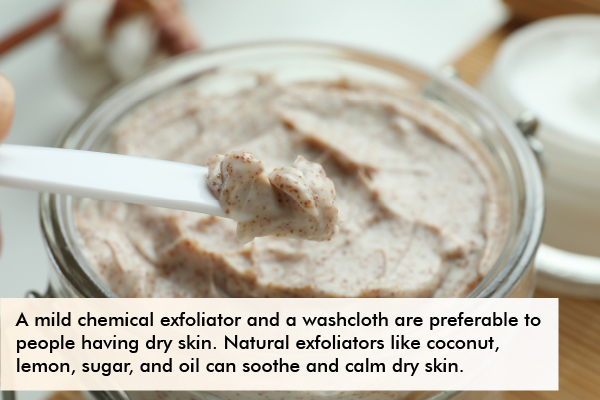
According to researchers, the maximum frequency of exfoliation recommended for people with dry skin is twice a week.
A mild chemical exfoliator (glycolic acid) and a washcloth are preferable for people with dry skin, as a mechanical exfoliator can irritate dry skin. (5)
You can also use natural exfoliators such as coconut, lemon, sugar, and oil to soothe and calm dry skin.
How to use:
- Combine 1 tbsp each of sugar, coconut oil, and lemon juice in a bowl.
- Apply this scrub to your face and massage gently in circular motions using your fingertips.
- Wash it off with lukewarm water after 10 minutes.
- Apply your preferred moisturizer.
6. Wear sunscreen
Wearing sunscreen is crucial for everyone, especially for people with dry skin, as UV exposure can dehydrate and damage their skin. (6) It is the last step in a summer skin care routine.
Choose a broad-spectrum sunscreen with at least SPF 30 or more. (7) Reapply every 2 hours and more often if you swim or sweat. You can also buy sunscreen with hydrating properties formulated for dry skin, such as DFM 30 moisturizers and sunscreen. (8)
Night Routine
A good night routine is essential to complete your summer skin care regimen for dry skin. Start with cleansing and toning and finish with a night cream for dry skin.
Researchers recommend using night cream containing curry plant (Helichrysum italicum) extract, carnosine, and melatonin. (9) These ingredients significantly improve skin tonicity and hydration and reduce skin roughness. If used topically, it supports antiaging effects on the skin. (10)
A night cream application effectively improves dry skin.
Dos and Don’ts for Summer Skin Care Routine for Dry Skin
Follow these dos and don’ts to get rid of dry skin.
Dos
- Do exfoliate gently. Skin exfoliation improves skin tone and texture and eliminates dead skin cells. (11) However, don’t use harsh scrubs or overdo them, as they can dry out your skin and lead to irritation. Exfoliate gently once or twice a week with a gentle exfoliator, followed by moisturizer application. (12) You can also use soothing or hydrating exfoliators on dry skin, such as jojoba meal, (13) tree tomato, cucumber extract, and rose hip seed powder. (14)
- Do drink more water. According to researchers, taking enough fluid to keep yourself hydrated (1) is crucial for your skin and overall well-being. When your body has adequate water, it flushes out toxins, keeps skin elastic and plum, and controls body temperature. So, drink at least 8 glasses of water daily, and increase this amount if you sweat or exercise. (15)
- Do apply moisturizer immediately after washing. Use creams, ointments, and lotions to trap the current moisture in your skin. Apply moisturizer right after drying your face after cleansing your hands or face to lock in the water. (16)
- Do apply a cream or ointment rather than a lotion. Creams and ointments are more effective than lotion and less irritating. So, choose an ointment and cream containing one or more of these: dimethicone, lactic acid, jojoba oil, glycerine, shea butter, lanolin, hyaluronic acid, and mineral oil. (16)
- Do apply only mild, fragrance-free skin care products. Products such as soaps and deodorants are harsh on dry and sensitive skin. Dermatologists advise using fragrance-free products. (16)
Don’ts
- Don’t use hot water. Avoid using hot water and aggressive skin cleansing. They strip away your skin’s natural protective oil and moisture and leave your skin irritated and dry. Therefore, use cool or lukewarm water when showering or washing your face. (1) Limit your bath time to 10 minutes or less. Pat your skin dry using a soft towel instead of rubbing it.
- Don’t wear heavy makeup. Wearing heavy makeup can cause breakouts and dryness, make your skin look flaky and cakey, and clog pores. So, wear light and breathable makeup that hydrates the skin. You can also use makeup products with SPF for sun protection. (17)
- Don’t rub your skin with a towel. If you don’t want to damage your skin, avoid towel rubbing as it creates friction. Instead, gently pat dry your skin using a soft towel. (16)
- Don’t exfoliate your skin too often. Skin exfoliation is good, but doing it frequently can damage your skin barrier, making it dry, irritated, and inflamed. Therefore, exfoliate only once or twice a week if your skin is dry.
General Queries
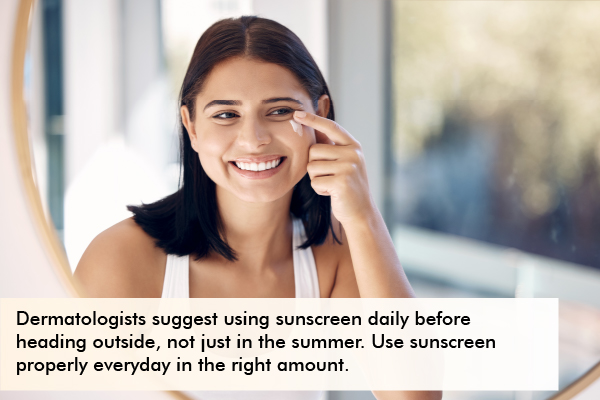
What active ingredients can enhance the texture and hydration level of dry skin in the summer, and how do they work?
Ingredients that can enhance the texture and hydration level of dry skin during the sunny season are as follows:
1. Humectants such as gelatin, urea, hyaluronic acid, glycerine, and ammonium lactate transfer water from the dermis to the epidermis.
2. Occlusives such as stearyl alcohol, petrolatum, lanolin, cholesterol, and paraffin prevent water loss by forming a hydrophobic layer.
3. Emollients such as propylene glycol, dimethicone, and petrolatum (1) fill cracks and gaps in the skin.
What ingredients in skin care products should I avoid to maintain my skin’s natural oils in the summer?
Avoid skin care products containing the following ingredients to preserve your skin’s natural oils in the summer:
• Alcohol, phthalates, dyes (apart from hand sanitizer)
• Fragrances such as that used in deodorant and soaps
Your skin will keep its natural oils if you eliminate these products. (16)
Can sunscreen bought last summer be used this summer, or does purchasing a new bottle every year necessary? Does sunscreen lose its strength?
As dermatologists suggest, use sunscreen daily before heading outside, not just in the summer. If you use sunscreen properly every day in the right amount, the bottle won’t last long.
But if you do find an unused bottle of sunscreen for some time, follow these guidelines:
1. According to the FDA, all sunscreens must maintain their original strength for at least three years.
2. The expiration date is mentioned in some sunscreen, and it shouldn’t be used past the expiration date.
3. If you get sunscreen without an expiration date, jot down the purchase date on the bottle to throw it out when it’s time.
4. Look for any visible signs, such as a change in consistency or color of the product. It’s time to get a new sunscreen bottle if the product doesn’t look good for use. (7)
Final Word
Dealing with dry skin during summer can be a challenging task. Observe a proper skin care routine to keep your skin glowing, nourished, and hydrated.
Follow the dos and don’ts listed above and use products that will soothe your skin to enjoy beautiful and healthy skin all summer.
References
- Xeroderma – StatPearls – NCBI Bookshelf. https://www.ncbi.nlm.nih.gov/books/NBK565884/.
- Mukhopadhyay P. Cleansers and their role in various dermatological disorders. Indian journal of dermatology. https://www.ncbi.nlm.nih.gov/pmc/articles/PMC3088928/. Published January 2011.
- Impact factor: 6.252 formulation and evaluation of Herbal face Toner – IJARSCT. https://ijarsct.co.in/Paper4872.pdf.
- Bilodeau K. Skin serum: What it can and can’t do. Harvard Health. https://www.health.harvard.edu/blog/skin-serum-what-it-can-and-cant-do-2018061214029. Published June 12, 2018.
- How to safely exfoliate at home. American Academy of Dermatology. https://www.aad.org/public/everyday-care/skin-care-secrets/routine/safely-exfoliate-at-home.
- Ngoc LTN, Tran VV, Moon J-Y, Chae M, Park D, Lee Y-C. Recent trends of Sunscreen Cosmetic: An update review. MDPI. https://www.mdpi.com/2079-9284/6/4/64. Published November 1, 2019.
- Sunscreen faqs. American Academy of Dermatology. https://www.aad.org/public/everyday-care/sun-protection/shade-clothing-sunscreen/sunscreen-faqs.
- Baldwin H, Santoro F, Lachmann N, Teissedre S. A novel moisturizer with high sun protection factor improves cutaneous barrier function and the visible appearance of rosacea-prone skin. Journal of cosmetic dermatology. https://www.ncbi.nlm.nih.gov/pmc/articles/PMC6916358/. Published December 2019.
- Milani M, Sparavigna A. Antiaging efficacy of melatonin-based day and night creams: A randomized, split-face, assessor-blinded proof-of-concept trial. Clinical, cosmetic and investigational dermatology. https://www.ncbi.nlm.nih.gov/pmc/articles/PMC5788993/. Published January 24, 2018.
- Granger C, Brown A, Aladren S, Narda M. Night cream containing melatonin, Carnosine and Helichrysum italicum extract helps reduce skin reactivity and signs of photodamage: Ex vivo and clinical studies. Dermatology and therapy. https://www.ncbi.nlm.nih.gov/pmc/articles/PMC7649196/. Published December 2020.
- Review article: Skin care with exfoliation process – ijcspub.org. https://www.ijcspub.org/papers/IJCSP22B1150.pdf.
- How to safely exfoliate at home. American Academy of Dermatology. https://www.aad.org/public/everyday-care/skin-care-secrets/routine/safely-exfoliate-at-home.
- Research Journal of Topical and Cosmetic Sciences. https://www.rjtcsonline.com/HTMLPaper.aspx.
- (PDF) skin care with herbal exfoliants – researchgate. https://www.researchgate.net/publication/224892687/.
- Popkin BM, D’Anci KE, Rosenberg IH. Water, hydration, and health. Nutrition reviews. https://www.ncbi.nlm.nih.gov/pmc/articles/PMC2908954/. Published August 2010.
- Dermatologists’ top tips for relieving dry skin. American Academy of Dermatology. https://www.aad.org/public/everyday-care/skin-care-basics/dry/dermatologists-tips-relieve-dry-skin.
- US20060222606A1 – translucent, sunscreening cosmetic foundation composition. Google Patents. https://patents.google.com/patent/US20060222606A1/en.


